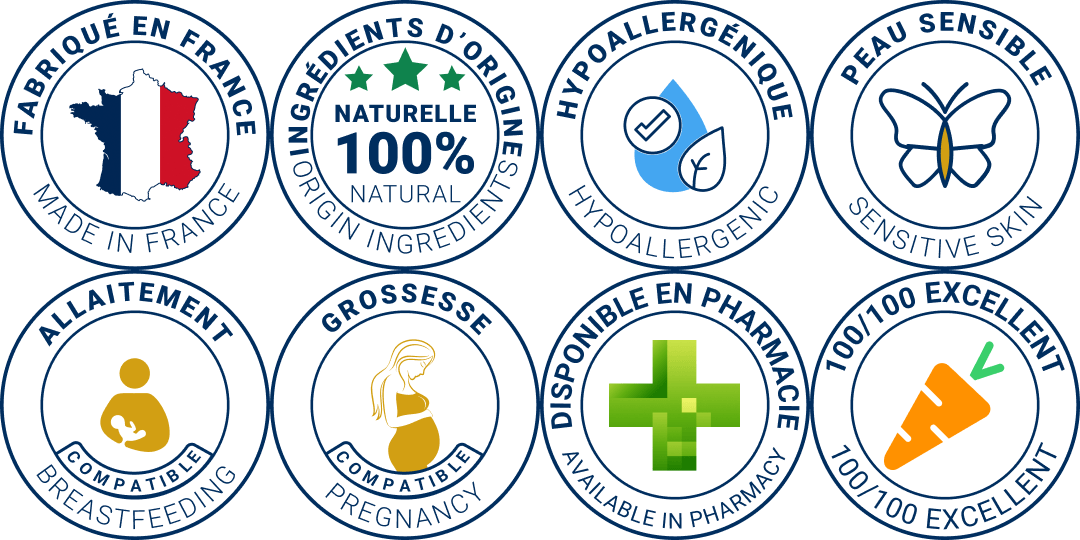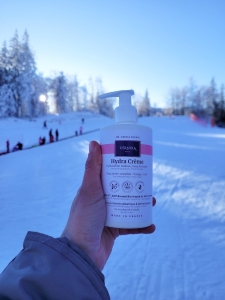Reading Time: mins
A baby's skin is extremely delicate and still developing, making it particularly vulnerable to sun damage. UV rays, known for their harmful effects on the skin, can cause far more damage to the fragile skin of infants. Without adequate protection, children are exposed to an increased risk of sunburn and long-term skin problems such as skin cancer. This article aims to provide you with an in-depth understanding of the importance of sun protection for babies, based on recent scientific research and focusing on the natural products recommended by Vernixa.
Babies require a specific approach when it comes to sun protection. Their skin can't simply be treated like an adult's; it's much thinner and produces less melanin, making them more susceptible to burns and sun damage. What's more, their temperature regulation system is less developed, making them more vulnerable to heatstroke. Knowing this information helps us to understand why appropriate, preventive sun protection is crucial from an early age.
Protecting baby's skin from the sun is not a task to be taken lightly. This requires constant attention and the rigorous application of several protection strategies. These strategies include the use of protective clothing, the application of sun cream specifically formulated for babies' sensitive skin, and the adoption of good daily practices such as choosing appropriate times for outdoor outings. By following this guide, you'll be better equipped to protect your baby's delicate skin from the sun's dangers.
Babies' skin is exceptionally sensitive to ultraviolet (UV) rays, due to its thinness and low melanin production. This heightened sensitivity means that even brief exposure to the sun without adequate protection can cause immediate and long-term damage. Scientific research has established a clear link between early sun exposure and an increased risk of developing skin problems, including cancers, later in life. It is therefore imperative to take proactive and preventive measures to minimize this exposure.
The construction of the skin barrier in babies is an ongoing process that will not be fully completed until adolescence. During this period of development, the skin is less able to defend itself against environmental aggressors, including UV rays. This makes the use of specific sun protection products for babies not only recommended, but essential for maintaining the child's skin health.
In addition to using appropriate sun creams, understanding the potential impact of sun exposure on baby's skin is crucial to adopting a holistic approach to sun protection. This includes recognizing the signs of sun damage, such as redness or dryness, and taking immediate steps to treat these symptoms. Constant awareness and education about the dangers of the sun are vital to ensure your child's health and well-being.
The importance of choosing the right times of day to expose babies to the sun cannot be underestimated. UV rays are strongest and therefore most harmful between 10 am and 4 pm. Avoiding sun exposure during these hours can significantly reduce the risk of sunburn and other skin damage. If an outing is unavoidable, staying in the shade or using an umbrella is good practice.
It's also essential to be aware that UV rays can penetrate clouds and reflect off surfaces such as water, sand and even concrete, increasing the risk of exposure even on overcast days. This knowledge helps plan outdoor activities to minimize direct sun exposure for babies. Adopting strategies such as using protective clothing and seeking out natural or artificial shade can provide an extra layer of protection against harmful UV rays.
Protective clothing plays a crucial role in preventing sun damage. Opting for light-colored, long-sleeved clothing, wide-brimmed hats and sunglasses specially designed for babies can offer a significant barrier against UV exposure. Clothing with an ultraviolet protection factor (UPF) gives an indication of the amount of UV radiation blocked by the fabric. Choosing clothing with a high UPF rating guarantees optimum protection for babies' sensitive skin when they venture outdoors.
Applying a sunscreen suitable for babies is a fundamental aspect of sun protection. Choosing a sunscreen with a sun protection factor (SPF) of 50 or more, which is free from irritating ingredients and specifically formulated for babies' sensitive skin, is crucial to ensuring adequate coverage against UVA and UVB rays. It's important to apply sunscreen 30 minutes before exposure to the sun, and to reapply every two hours, as well as after every swim or activity involving excessive perspiration.
Preferring formulas based on mineral filters such as titanium dioxide or zinc oxide can be beneficial for sensitive skin, as they are less likely to cause allergic reactions or irritation. What's more, these compounds work by reflecting UV rays back to the skin's surface, rather than absorbing them, offering more natural, gentler protection. Checking ingredients and choosing products free from parabens, phthalates and added fragrances will help minimize risks to your baby's delicate skin.
Maintaining good hydration is essential for a baby's overall health, especially during the summer months when temperatures and sun exposure increase. Make sure your baby consumes enough fluids, especially water, to stay properly hydrated throughout the day. Even mild dehydration can make babies more susceptible to heatstroke and other heat-related problems.
Using a pure water mist can offer immediate relief on hot days, helping to gently cool baby's skin. It's also important to keep your baby's room cool and well-ventilated at night to avoid any discomfort or sleep disruption due to heat. Adopting measures such as using fans, limiting sun exposure during the hottest hours, and choosing light, breathable clothing will help ensure your child's comfort and well-being.
After even moderate sun exposure, it's essential to take care of your baby's skin to help restore moisture and soothe any irritation. After-sun products designed specifically for babies' sensitive skin, enriched with soothing and moisturizing agents such as aloe vera, can be very beneficial. These products not only help calm the skin after sun exposure, but also repair and strengthen the skin barrier.
Exploring Vernixa's range of natural products, formulated with gentle, effective ingredients, can be a great way to complement your baby care routine. Taking into account the unique needs of your baby's skin and engaging in a holistic approach to sun protection will not only ensure your child's safety, but also maintain healthy, happy skin.
Effectively protecting your baby's delicate skin from the harmful effects of the sun requires a careful and informed approach. By adopting the sun protection strategies covered in this guide, including choosing protective clothing, regularly applying suitable sunscreen, and ensuring adequate hydration, you can provide your child with a solid foundation for long-term skin health.


All Rights Reserved | Tous Droits Réservés GTIN Compliance Hydra Lavant | GTIN Compliance Hydra Crème



